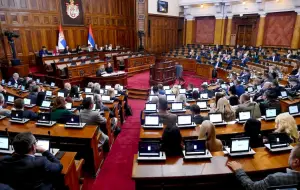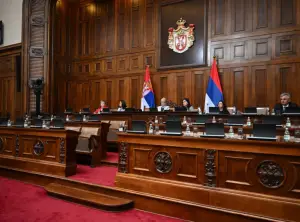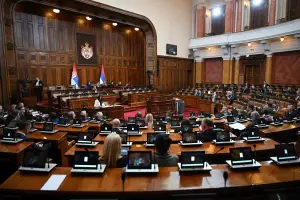- Serbia
Get to know Serbia
- Citizens
Culture and science
Health services
Pension and disability insurance
- Business
Employment
Economy
- Media
- Government
- Contact
Keep in touch
Contact form
Back
Keepin touch
Whether you have a question, comment, suggestion or any problem in the purview of the government, send us your message and we will try to respond as soon as possible. If your problem is not in our purview, we will forward your message to the relevant institution.
Q:
A:
Parliament passes laws required for inclusion in Schengen white list
Belgrade,
23 October 2008
The Serbian parliament today adopted laws on foreigners, on border protection, on personal information protection and on confiscation of assets acquired through criminal activities.
The adoption of the law on foreigners means that Serbia as an independent state will for the first time regulate the issue of the entry, movement and stay of foreigners on Serbian territory.
The law is compatible with standards set forth by the Schengen Agreement.
This law will come into force on the eighth day from its publication, and will be implemented from April 1, 2009.
The Serbian parliament passed by majority vote the law on border protection which will prevent border violations, the spread of cross-border crime, protect public health and the environment and prevent illegal immigration.
The law will replace the earlier law passed in 1979, establishing an efficient system of border protection and high standards in border control and regulate cooperation between all relevant organizations.
Border protection will be demilitarized, and taken over by border police that will be part of the Interior Ministry, invested with specific authorities determined by law.
This is one of the laws necessary for Serbia’s inclusion in the Schengen “white list”, as well as the law on personal information protection, which was also passed by majority vote.
The law on personal information protection determines regulations concerning the processing and use of personal information and rights regarding personal information.
The law will be implemented from January 1, 2009.
The law concerning confiscation of assets acquired through criminal activities, also passed today, will be implemented from March 1, 2009 and will not be applicable to persons who were given witness collaboration status before January 1, 2009.
The adoption of the law on the accountability of ‘legal persons’ for their criminal acts makes businesses and companies subject to criminal responsibility for the first time ever.
Businesses or companies will be held responsible in cases where they profited from the illegal activities of a person involved in business activities related to them.
Amendments to the law on higher education were also adopted today, according to which the grades required for university admission next year have been lowered.
MPs also confirmed four international financial agreements, which will make it possible for Serbia to obtain loans worth €186 million for major infrastructure projects. These agreements concern loans for construct of the Belgrade ring-road, reconstruction of Gazela Bridge, the construction of 500 flats and improving environmental conditions.
The law is compatible with standards set forth by the Schengen Agreement.
This law will come into force on the eighth day from its publication, and will be implemented from April 1, 2009.
The Serbian parliament passed by majority vote the law on border protection which will prevent border violations, the spread of cross-border crime, protect public health and the environment and prevent illegal immigration.
The law will replace the earlier law passed in 1979, establishing an efficient system of border protection and high standards in border control and regulate cooperation between all relevant organizations.
Border protection will be demilitarized, and taken over by border police that will be part of the Interior Ministry, invested with specific authorities determined by law.
This is one of the laws necessary for Serbia’s inclusion in the Schengen “white list”, as well as the law on personal information protection, which was also passed by majority vote.
The law on personal information protection determines regulations concerning the processing and use of personal information and rights regarding personal information.
The law will be implemented from January 1, 2009.
The law concerning confiscation of assets acquired through criminal activities, also passed today, will be implemented from March 1, 2009 and will not be applicable to persons who were given witness collaboration status before January 1, 2009.
The adoption of the law on the accountability of ‘legal persons’ for their criminal acts makes businesses and companies subject to criminal responsibility for the first time ever.
Businesses or companies will be held responsible in cases where they profited from the illegal activities of a person involved in business activities related to them.
Amendments to the law on higher education were also adopted today, according to which the grades required for university admission next year have been lowered.
MPs also confirmed four international financial agreements, which will make it possible for Serbia to obtain loans worth €186 million for major infrastructure projects. These agreements concern loans for construct of the Belgrade ring-road, reconstruction of Gazela Bridge, the construction of 500 flats and improving environmental conditions.
-
 Belgrade, 4 January 2026
Belgrade, 4 January 2026Violation of UN Charter has become dominant principle of contemporary politics
-
 Belgrade, 21 December 2025
Belgrade, 21 December 2025Strengthening cooperation with Slovakia in many areas
-
 Belgrade, 21 December 2025
Belgrade, 21 December 2025President of Slovakia ceremonially welcomed in front of Palace of Serbia
-
 Belgrade, 18 December 2025
Belgrade, 18 December 2025Vučić welcomes President of Georgia in front of Palace of Serbia
-
 Belgrade, 15 December 2025
Belgrade, 15 December 2025Serbia needs strong, stable education system
-
 Belgrade, 3 December 2025
Belgrade, 3 December 2025Parliament adopts 2026 budget
-
 Belgrade, 28 November 2025
Belgrade, 28 November 2025Serbian President welcomes President of DR Congo
-
 Belgrade, 7 November 2025
Belgrade, 7 November 2025Parliament adopts multiple laws
-
 Belgrade, 22 October 2025
Belgrade, 22 October 2025Parliament adopts several laws, ratifies multiple international agreements
-
 Belgrade, 15 October 2025
Belgrade, 15 October 2025Vučić welcomes Ursula von der Leyen in front of Palace of Serbia
